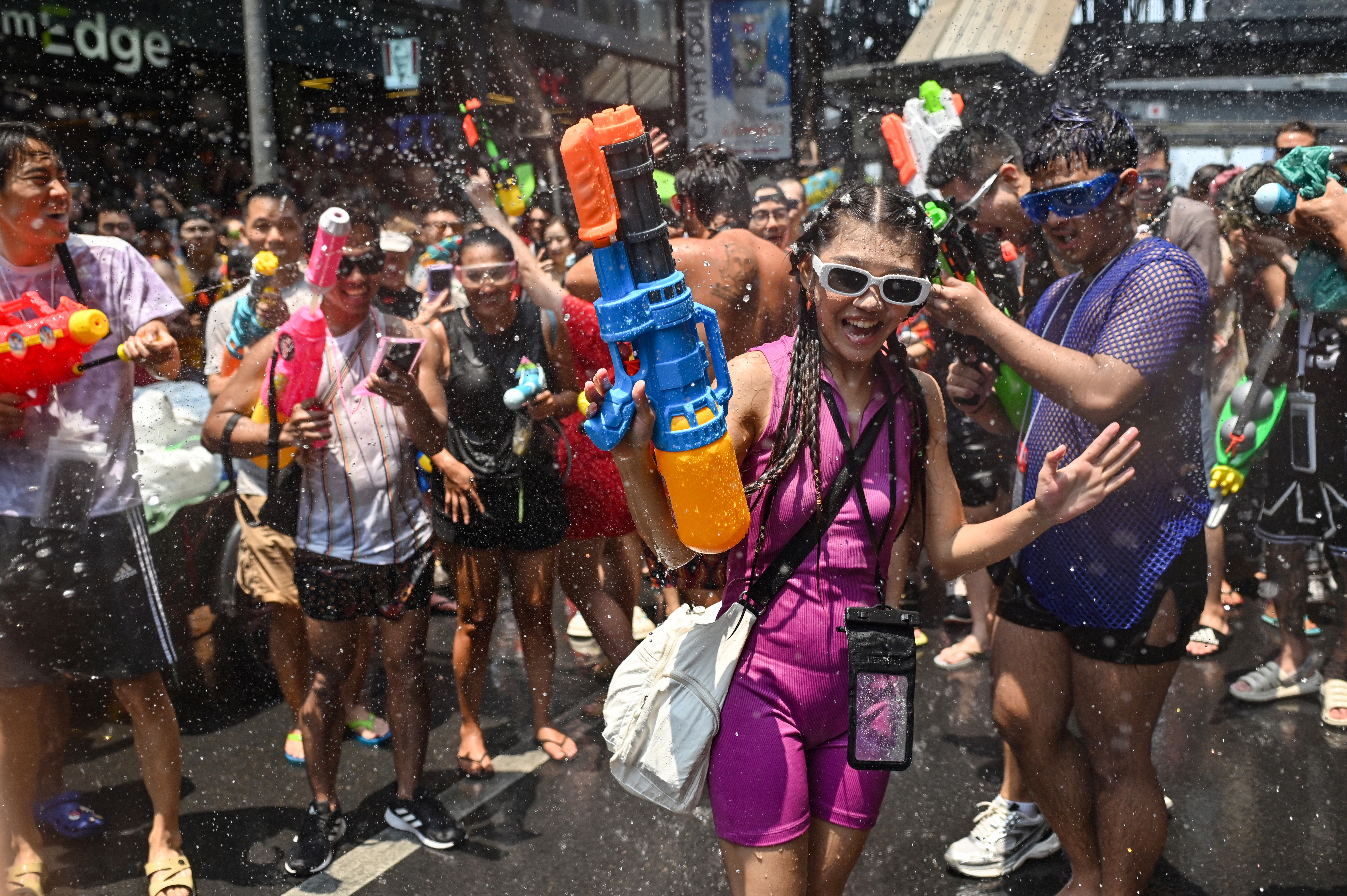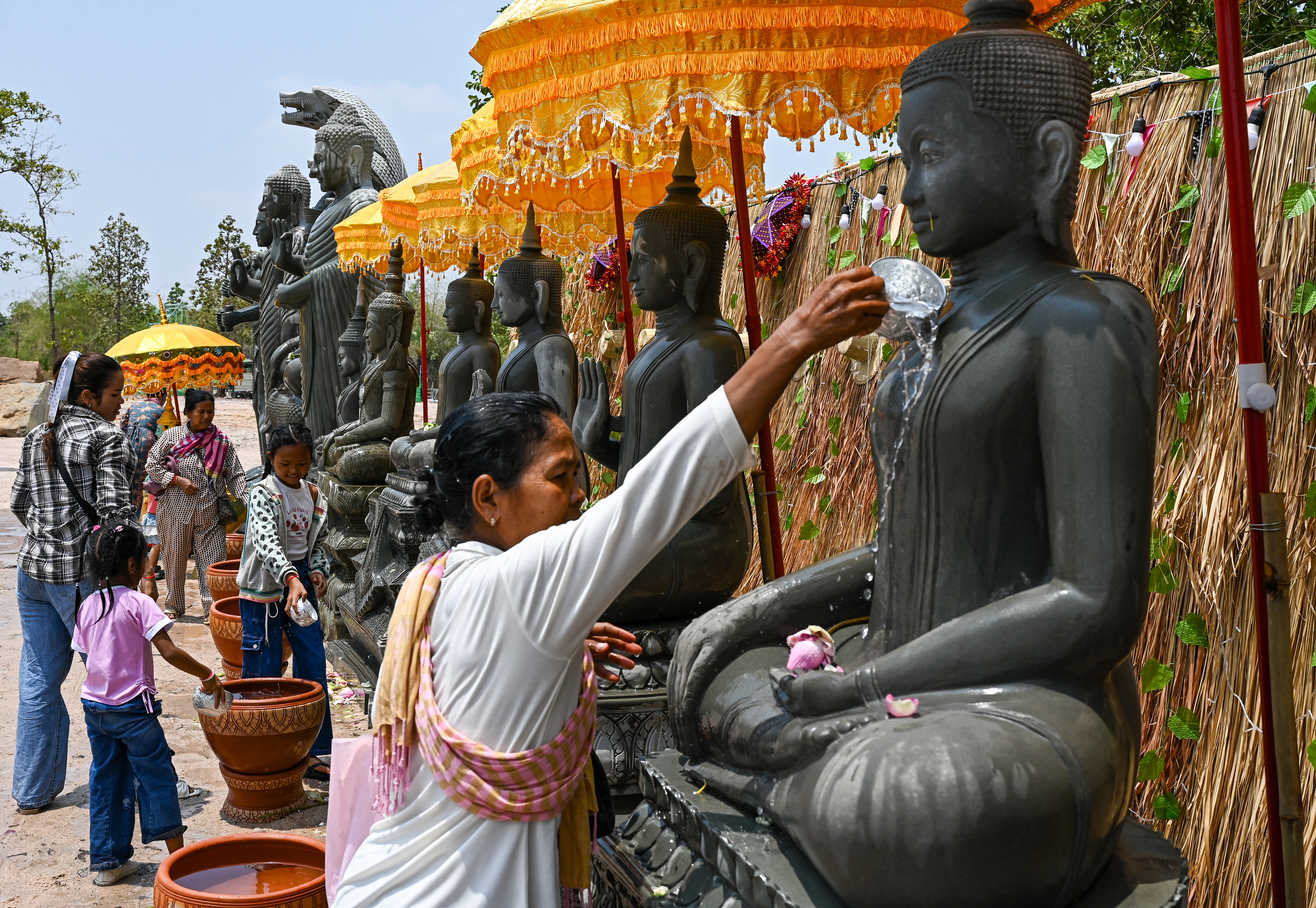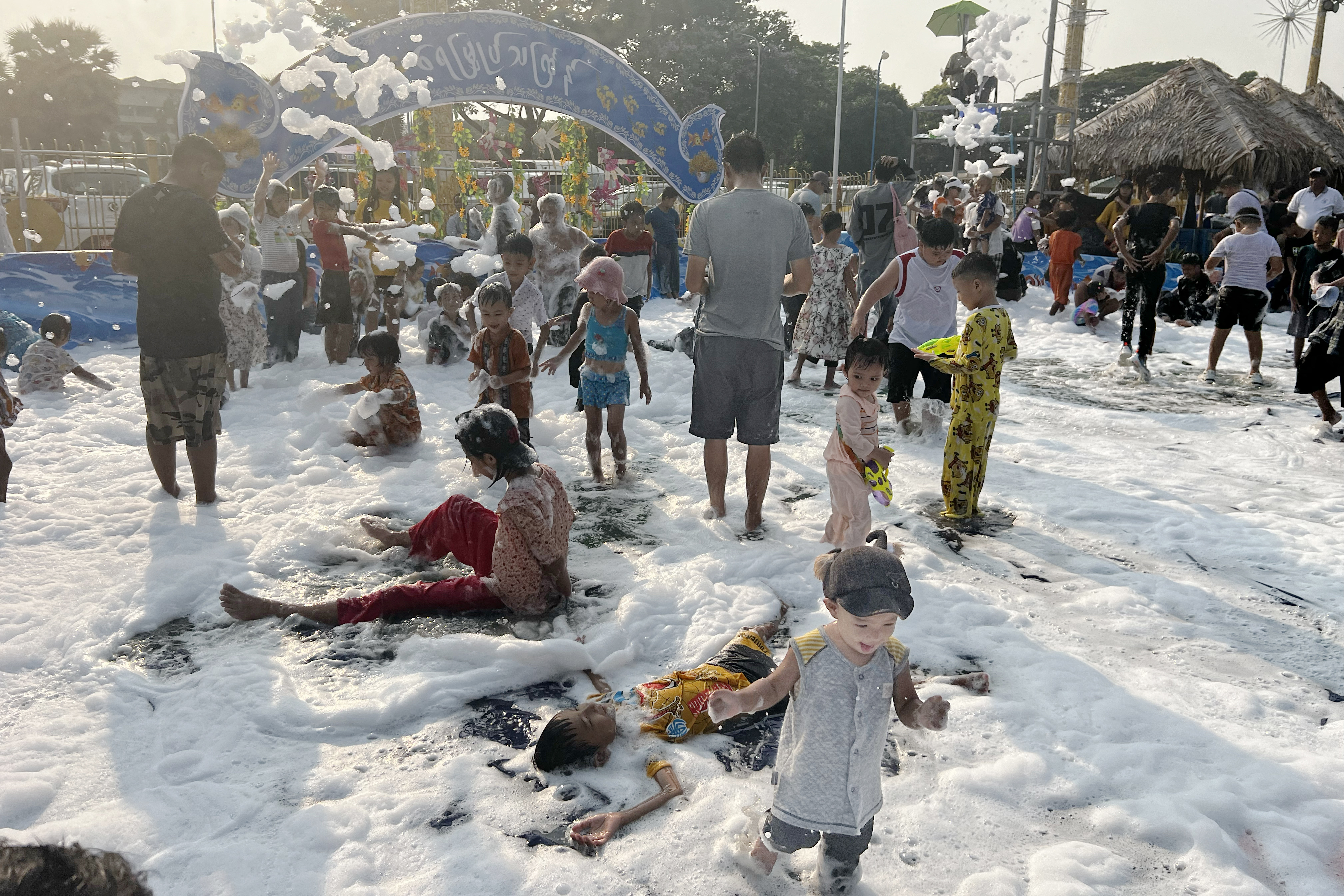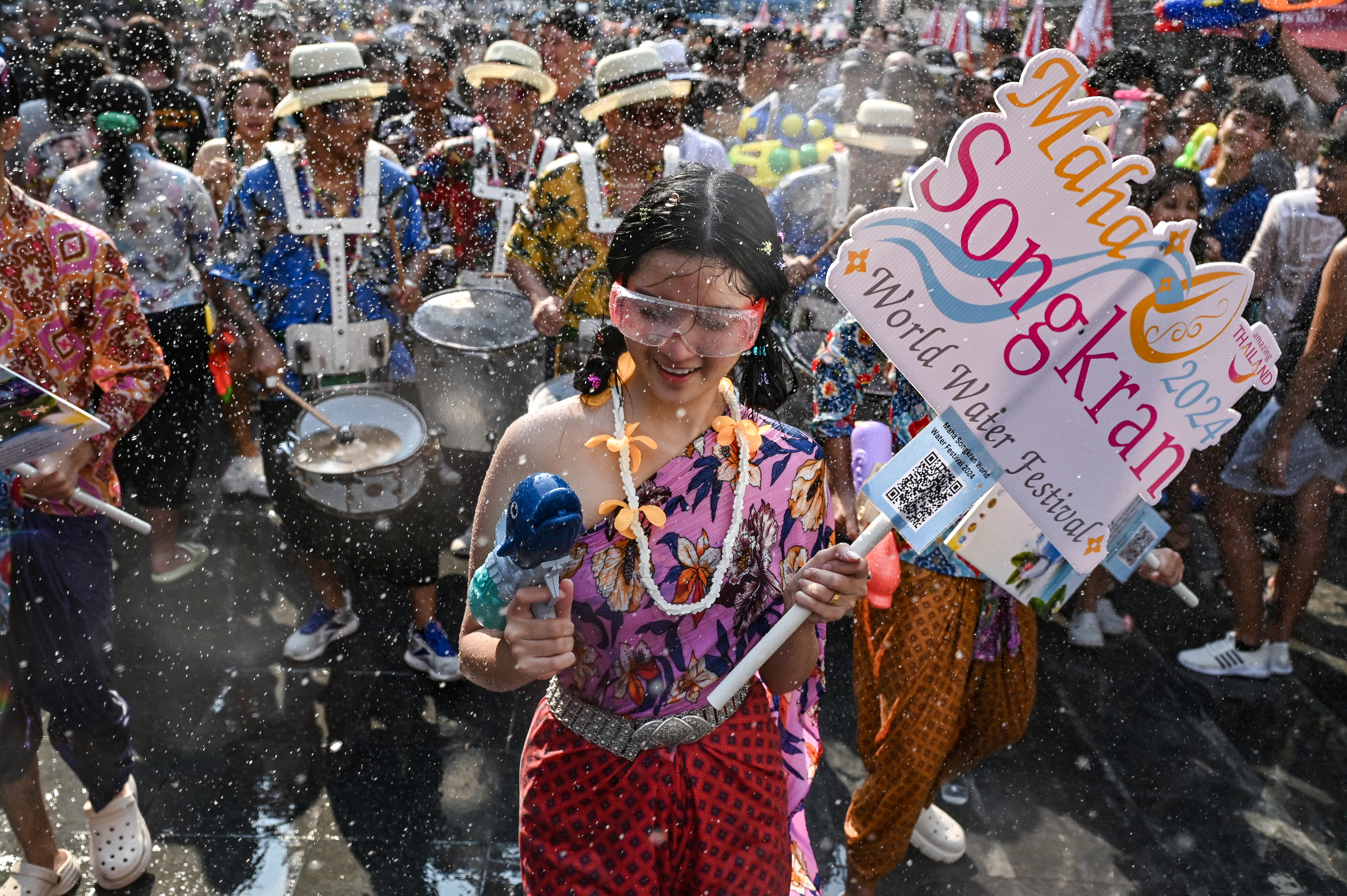
Millions of people in Southeast Asian countries of Cambodia, Laos, Myanmar and Thailand together with their leaders and tourists celebrate the traditional New Year water festival, an important event on the Buddhist calendar.
"The happiness of Songkran is not only enjoyed by Thai people but also people in Laos, Myanmar, Cambodia, and the Southwest part of China. The occasion brings us even closer with such cultural connections," said Bhokin Bhalakula, the former speaker of the Thai Parliament.
It is viewed as a time to symbolically wash away misfortunes, pray for prosperity for the coming year, reunite with family members, and honor ancestors and older adults, said Bhokin, who is also chairman of the Thai-Chinese Cultural Promotion and Development Association.
Massive crowds were seen on the streets of the Cambodian capital Phnom Penh as the four-day celebration of the Khmer New Year, or Choul Chnam Thmey, began on April 13
Massive crowds were seen on the streets of the Cambodian capital Phnom Penh as the four-day celebration of the Khmer New Year, or Choul Chnam Thmey, began on April 13.
In a New Year message, Cambodian Prime Minister Hun Manet sent his best wishes along with a reaffirmed commitment to bolster growth and prosperity despite global uncertainty.
"May the Year of the Dragon bring all Cambodian people with the five gems of Buddhist blessing: longevity, nobility, happiness, strength, and wisdom," he said.
The Chinese Embassy in Cambodia also extended its greetings and best wishes to Cambodian people from all walks of life.
The water festival, known locally as Pi Mai Lao in Laos, was celebrated from April 13 to April 18.
On the occasion of the Lao New Year, Lao President Thongloun Sisoulith extended best wishes to people from all walks of life across the country, as well as Lao expatriates abroad and foreign expatriates in Laos.

Laos is the chair of the Association of Southeast Asian Nations and this year marks the Visit Laos Year program.
Thongloun said he hopes people from different sectors can fully play their part in being good hosts, maintain social security and order, and do everything possible to make a good impression on foreign leaders and delegates, as well as visiting businesspeople and tourists.
Thongloun was among those celebrating the Songkran New Year parade in Luang Prabang on April 14, during which he dipped a branch into the scented water of flowers and sprinkled water to the guests as a gesture of blessings. Zhang Sheping, Chinese consul general in Luang Prabang, also followed the local custom to sprinkle water to express his wishes and respect.
To mark the festival, the Chinese Embassy in Laos sent greetings to Lao people and overseas Chinese in the country.
“May China and Laos enjoy peace and prosperity and may the China-Laos friendship last forever,” the embassy said in a message posted on its official WeChat account on April 12.

In Myanmar, despite ongoing conflicts between rebels and the military regime, people were also celebrating the water festival, known locally as Thingyan, on April 13-16. The Myanmar New Year fell on April 17.
Throughout the country, lively dance performances contributed to the festive atmosphere, marking the official opening of the Thingyan Water Festival on April 13, according to Xinhua News Agency.
In Thailand’s capital Bangkok, this year’s Songkran celebration was held between April 11 and 15, with many parades to mark the festival. There were also many other cultural performances from over 1,000 performers in five other major locations around the country, namely Chiang Mai, Khon Kaen, Phuket, Samut Prakan, and Chon Buri.
Last December, “Songkran in Thailand, traditional Thai New Year festival” was officially designated as an Intangible Cultural Heritage by UNESCO. To honor the designation, the Thai government extended this year's festival to 21 days starting from April 1.
This year’s festival is expected to boost the economy as millions of local and foreign tourists join the celebrations. The Tourism Authority of Thailand (TAT) estimated that the water festival, officially the “Maha Songkran World Water Festival”, will inspire more travel and tourism activities.

The TAT predicted 24.42 billion baht ($670 million) in overall tourism revenue from April 12 and 16, an increase of 18 percent compared to the same period last year.
They estimated 8.76 billion baht from international tourism and 15.66 billion baht from domestic tourism with 510,000 visitor arrivals and 4.29 million domestic trips.
In Thailand, Songkran refers to the sun’s annual passing into the Aries constellation, the first sign of the Zodiac, which marks the traditional start of the new year. Occurring in mid-April after the rice harvest, it is a time when people reunite with their families and pay their respects to older adults, ancestors, and sacred Buddha images.
A significant act during Songkran, pouring water symbolizes cleansing, reverence, and good fortune. Other activities include bathing important Buddha images, splashing water on family and friends, performing folk plays, games, music, and feasting. The Songkran tradition is passed on through participation in the festivities.
The Chinese Embassy in Thailand uploaded a video on its official WeChat account showing China’s Ambassador to Thailand Han Zhiqiang and other embassy staff pouring water, singing songs, and performing Thai dance to celebrate the festival.
Songkran promotes community cooperation, unity, and forgiveness, said Bhokin Bhalakula, the former Thai Parliament speaker.
"With some differences, we live in peace and share some beliefs in common. It's so beautiful like a garden with various colors of flowers," Bhokin said.
Contact the writers at kelly@chinadailyapac.com


